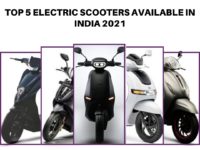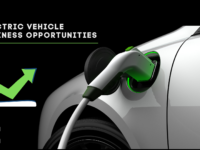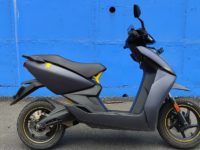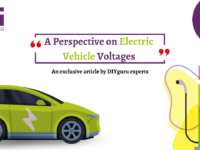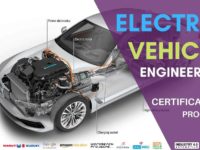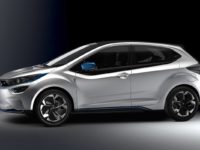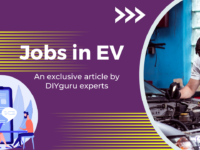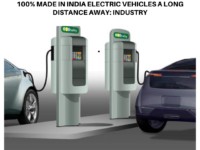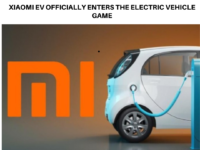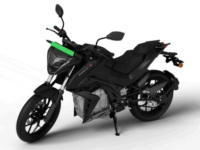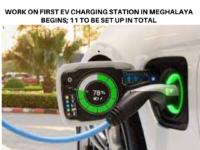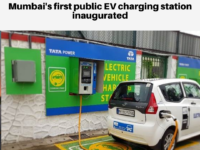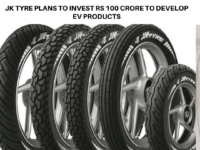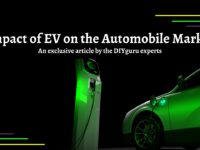Two years ago, startup firm Ather Energy Pvt. Ltd took a leap in the dark, launching two electric scooter models in India—340 and 450—a segment to which most established automakers gave a wide berth because the path to profits was unclear.
Despite the Modi administration’s grand vision to boost electric vehicle sales, lack of charging infrastructure and uncertainty over demand for higher-priced green vehicles have daunted most conventional manufacturers.
But a clutch of startup firms have revved up into the segment as they see a huge pay-off, if they get the technology and product right. Unlike for other vehicles, they are betting on their advantages of nimbleness and adaptability, just like US-based Tesla, to edge past conventional players.
“Manufacturing is a hard problem to solve. But it is not unsolvable. If a business model runs on innovation and is IP-driven, then less manufacturing excellence will not hold you back,” said Tarun Mehta, co-founder, Ather Energy.
Mehta said although Ather’s current production capacity is 30,000 units per year, it is able to utilize only a fraction of that due to supply chain issues. However, the startup has launched a new product 450X, with which it plans to ramp up volumes quickly. It is also setting up a manufacturing plant at Hosur with an estimated annual capacity of nearly 100,000 units.
“Once our annual volumes reach in the 50,000–100,000 unit range, we would not require an infusion of additional funds as we would become operationally sustainable. We expect this to happen by 2021-end or 2022,” Mehta said in an interview.
Meanwhile, another startup firm Tork Motors, said it will ramp up capacity to about 20,000 vehicles per year from around 1,000 currently, even as it gears up to launch its first product–an electric motorcycle named T6X—in the June quarter this year.
“We expect that once we sell about 20,000–30,000 units per year, we would break even and start earning some margins on our products,” said Kapil Shelke, founder at Tork Motors.
Ather Energy and Tork Motors are among a handful of startups that have strong financial backing from high profile investors. Ather, for example, has secured funding from the founders of Flipkart, Sachin Bansal and Binny Bansal, Innoven Capital and Tiger Global besides India’s largest two-wheeler maker Hero MotoCorp Ltd. Tork Motors meanwhile has raised funds from Bharat Forge Ltd, Ola founder Bhavish Aggarwal and Ratan Tata.
There are about a dozen startups in electric mobility, not all of whom have equally strong financial backing. Established players such as Bajaj Auto Ltd and TVS Motor Co. Ltd are only just nudging into the segment. While no more than 4-5 start-up firms are likely to sustain in the long run, their nimbleness in technology and ability to tool products quickly would likely mean that they maintain a lead in adoption of electric mobility, despite the entry of conventional players.
According to the Society of Manufacturers of Electric Vehicles (SMEV), the domestic EV industry’s size stood at 129,600 units in FY19, including 126,000 electric two-wheelers and 3,600 electric four-wheelers. This is an increase from 54,800 electric two-wheelers and 1,200 electric four-wheelers sold in FY18.
Meanwhile, the electric three-wheeler segment, which is largely unorganized and dominated by imports from China, is estimated at over 600,000 units in 2018-19.
With an outlay of ₹10,000 crore between FY20-FY22, the government’s Faster Adoption and Manufacturing of Hybrid and Electric Vehicles or FAME 2 scheme supports electric two- and three-wheelers as well as e-buses and four-wheelers with only commercial registration for incentives. Further, the government levies 5% GST on EVs and also offers an exemption on interest paid on loans to assist EV adoption in India.
Opportunities around the electric mobility ecosystem are classified into three broad categories: product manufacturing, EV charging infrastructure and services. Startups in electric mobility cater to all the three opportunity areas as new business models are starting to emerge.
For example, Ather Energy not only develops and manufactures its own products, but it also offers charging infrastructure through its own grid and consumer services that include over-the-air software upgrades along with new ownership models such as subscription and leasing.
Pune-based Tork Motors plans to offer new ownership models including leasing options and is already setting up fast-charging infrastructure in Pune as it gears up to launch T6X soon.
In contrast, while Bajaj Auto offers to install EV charging sockets for the buyers of its first electric scooter—Chetak, rival TVS Motor plans to create a charging network for its iQube electric scooter in Bengaluru. Both the companies are, however, yet to formally launch any new ownership plans for their electric scooters. Meanwhile, Tata Motors Ltd on 28 January announced that it would offer subscription and leasing options to the customers of its Nexon electric compact sport-utility vehicle.
Shailesh Chandra, president, electric mobility business unit, Tata Motors said leasing and subscription plans are the new-age ownership models to bring customers on board before they can convincingly adopt the new technology. “Ather took nearly two years to announce scaling up of its operations beyond two cities and solve its production constraints. For Bajaj Auto or TVS Motor, scaling up production and product availability would not take more than a few days,” said a consultant, requesting anonymity, as he explained how existing players can leverage their supply chain and network to expand the market.
“However, it is to be noted that until EVs become a reasonably sustainable business case, incumbents will remain cautious as expansion in a low-demand scenario will not only put pressure on their margins but also that of their dealers. Secondly, the priority is BS-VI transition and market recovery,” he added.
Goldie Srivastava, co-founder and chief executive at SmartE, a five-year-old startup that is already one of India’s largest electric mobility service providers said the incumbents would eventually shape up the domestic EV market as they have capacity, manpower and supply chain in place. “Product innovation is led by startups, who will also lead services furthering adding to the EV adoption. But manufacturing is a capital-intensive industry, where OEMs clearly have an upper hand,” he said.
Stakeholders believe that the existing players would acquire several startups as the business case for EVs becomes sustainable. Besides Hero, examples where OEMs have already made investments in startup firms include Ather, TVS Motors’ investment in Ultraviolette Automotive Pvt. Ltd, Bajaj Auto in Yulu, and Bharat Forge in Tork Motors.
Vinodkumar Ramachandran, partner and head, automotive and industrial manufacturing, KPMG in India said globally about 80% of the earmarked capital investments by large automakers are being put into future business opportunities such as electric mobility, new technologies and business models. “Only 20% of their capital investments are going into manufacturing,” he added.
But a clutch of startup firms have revved up into the segment as they see a huge pay-off, if they get the technology and product right. Unlike for other vehicles, they are betting on their advantages of nimbleness and adaptability, just like US-based Tesla, to edge past conventional players.
“Manufacturing is a hard problem to solve. But it is not unsolvable. If a business model runs on innovation and is IP-driven, then less manufacturing excellence will not hold you back,” said Tarun Mehta, co-founder, Ather Energy.
Mehta said although Ather’s current production capacity is 30,000 units per year, it is able to utilize only a fraction of that due to supply chain issues. However, the startup has launched a new product 450X, with which it plans to ramp up volumes quickly. It is also setting up a manufacturing plant at Hosur with an estimated annual capacity of nearly 100,000 units.
“Once our annual volumes reach in the 50,000–100,000 unit range, we would not require an infusion of additional funds as we would become operationally sustainable. We expect this to happen by 2021-end or 2022,” Mehta said in an interview.
Meanwhile, another startup firm Tork Motors, said it will ramp up capacity to about 20,000 vehicles per year from around 1,000 currently, even as it gears up to launch its first product–an electric motorcycle named T6X—in the June quarter this year.
“We expect that once we sell about 20,000–30,000 units per year, we would break even and start earning some margins on our products,” said Kapil Shelke, founder at Tork Motors.
Ather Energy and Tork Motors are among a handful of startups that have strong financial backing from high profile investors. Ather, for example, has secured funding from the founders of Flipkart, Sachin Bansal and Binny Bansal, Innoven Capital and Tiger Global besides India’s largest two-wheeler maker Hero MotoCorp Ltd. Tork Motors meanwhile has raised funds from Bharat Forge Ltd, Ola founder Bhavish Aggarwal and Ratan Tata.
There are about a dozen startups in electric mobility, not all of whom have equally strong financial backing. Established players such as Bajaj Auto Ltd and TVS Motor Co. Ltd are only just nudging into the segment. While no more than 4-5 start-up firms are likely to sustain in the long run, their nimbleness in technology and ability to tool products quickly would likely mean that they maintain a lead in adoption of electric mobility, despite the entry of conventional players.
According to the Society of Manufacturers of Electric Vehicles (SMEV), the domestic EV industry’s size stood at 129,600 units in FY19, including 126,000 electric two-wheelers and 3,600 electric four-wheelers. This is an increase from 54,800 electric two-wheelers and 1,200 electric four-wheelers sold in FY18.
Meanwhile, the electric three-wheeler segment, which is largely unorganized and dominated by imports from China, is estimated at over 600,000 units in 2018-19.
With an outlay of ₹10,000 crore between FY20-FY22, the government’s Faster Adoption and Manufacturing of Hybrid and Electric Vehicles or FAME 2 scheme supports electric two- and three-wheelers as well as e-buses and four-wheelers with only commercial registration for incentives. Further, the government levies 5% GST on EVs and also offers an exemption on interest paid on loans to assist EV adoption in India.
Opportunities around the electric mobility ecosystem are classified into three broad categories: product manufacturing, EV charging infrastructure and services. Startups in electric mobility cater to all the three opportunity areas as new business models are starting to emerge.
For example, Ather Energy not only develops and manufactures its own products, but it also offers charging infrastructure through its own grid and consumer services that include over-the-air software upgrades along with new ownership models such as subscription and leasing.
Pune-based Tork Motors plans to offer new ownership models including leasing options and is already setting up fast-charging infrastructure in Pune as it gears up to launch T6X soon.
In contrast, while Bajaj Auto offers to install EV charging sockets for the buyers of its first electric scooter—Chetak, rival TVS Motor plans to create a charging network for its iQube electric scooter in Bengaluru. Both the companies are, however, yet to formally launch any new ownership plans for their electric scooters. Meanwhile, Tata Motors Ltd on 28 January announced that it would offer subscription and leasing options to the customers of its Nexon electric compact sport-utility vehicle.
Shailesh Chandra, president, electric mobility business unit, Tata Motors said leasing and subscription plans are the new-age ownership models to bring customers on board before they can convincingly adopt the new technology. “Ather took nearly two years to announce scaling up of its operations beyond two cities and solve its production constraints. For Bajaj Auto or TVS Motor, scaling up production and product availability would not take more than a few days,” said a consultant, requesting anonymity, as he explained how existing players can leverage their supply chain and network to expand the market.
“However, it is to be noted that until EVs become a reasonably sustainable business case, incumbents will remain cautious as expansion in a low-demand scenario will not only put pressure on their margins but also that of their dealers. Secondly, the priority is BS-VI transition and market recovery,” he added.
Goldie Srivastava, co-founder and chief executive at SmartE, a five-year-old startup that is already one of India’s largest electric mobility service providers said the incumbents would eventually shape up the domestic EV market as they have capacity, manpower and supply chain in place. “Product innovation is led by startups, who will also lead services furthering adding to the EV adoption. But manufacturing is a capital-intensive industry, where OEMs clearly have an upper hand,” he said.
Stakeholders believe that the existing players would acquire several startups as the business case for EVs becomes sustainable. Besides Hero, examples where OEMs have already made investments in startup firms include Ather, TVS Motors’ investment in Ultraviolette Automotive Pvt. Ltd, Bajaj Auto in Yulu, and Bharat Forge in Tork Motors.
Vinodkumar Ramachandran, partner and head, automotive and industrial manufacturing, KPMG in India said globally about 80% of the earmarked capital investments by large automakers are being put into future business opportunities such as electric mobility, new technologies and business models. “Only 20% of their capital investments are going into manufacturing,” he added.
Join our list
Subscribe to our mailing list and get interesting stuff and updates to your email inbox.


